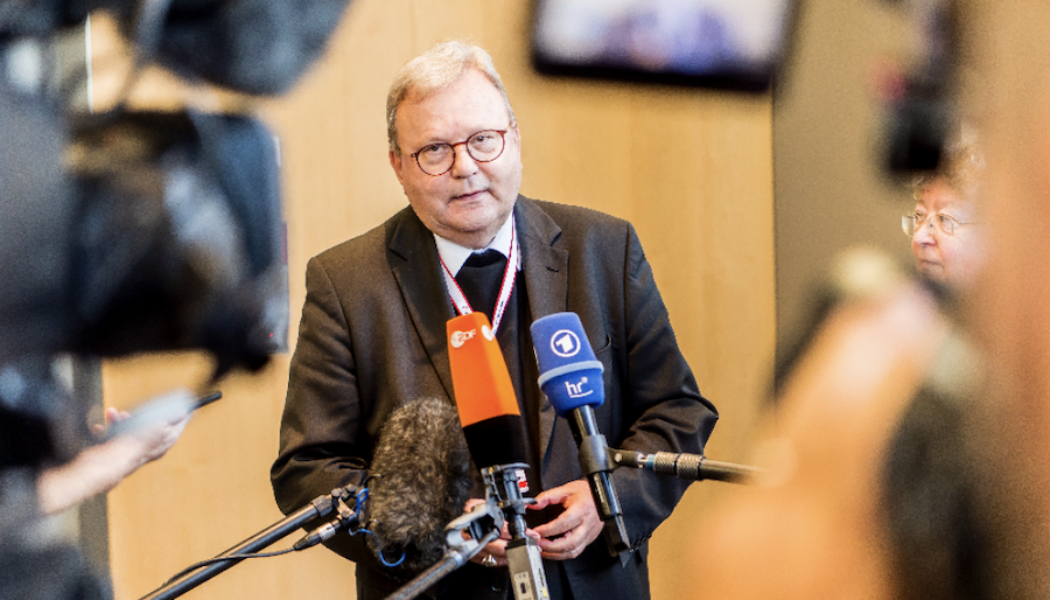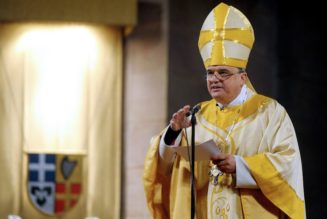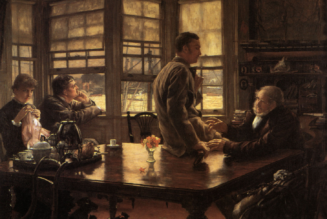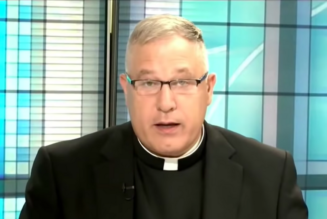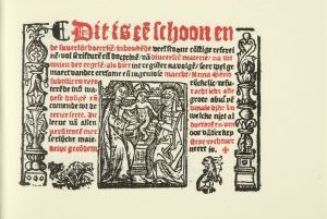
The deputy chairman of the German bishops’ conference on Thursday invited Catholics in his diocese to contact parishes for liturgical blessings of their same-sex partnerships and other relationships regarded as morally illicit in the Catholic Church.
The move comes after the “synodal way” – an assembly of laity and bishops aiming to reform the Church in Germany – approved last week a resolution urging German bishops to officially permit same-sex blessings in their dioceses.
Because the Vatican announced recently that such blessings are impossible for the Church, some Catholics have asked whether Bishop Franz-Josef Bode’s announcement is formally an act of schism, a canonical crime which carries with it the penalty of excommunication.
To date, the Vatican has not declared Bode, or anyone involved in the German synodal way, guilty of schism — an action that would have significant consequences in civil and canon law, and could prompt complicated civil litigation.
But if the Vatican wants to sanction Bode without prompting debate about schism and its consequences, there are other canonical crimes for which the bishop could likely be called to account.
Still, as long as the Vatican does not intervene over Bode’s action, the German bishops are claiming a kind of victory by omission — arguing that liturgical blessings have already become status quo, and suggesting that Rome should rescind its earlier prohibitions against them.
—
The bishops of Germany and the lay-run Central Committee of German Catholics set out in 2019 on a “synodal path” aimed at calling for women’s ordination to the priesthood, a revision of Catholic sexual doctrine and liturgical practice, and establishing a deliberative role for laity in decisions about governance in the Church.
Pope Francis and other Vatican officials pushed back on the meeting while it was still in the planning stages, urging the bishops to have a synod on evangelization, and declaring that plans for the “synodal way” were, in Vatican-speak, “not ecclesiologically valid.”
But the German bishops and lay leaders proceeded despite those warnings, and despite later criticisms from both participants and the Holy See, including repeated affirmations from the Vatican that the synodal path didn’t actually have the power to set policy for particular Churches or the universal Church.
Those warnings tempered some elements of the synod, but not all. Synodal participants have lowered the temperature in official documents on calls for the ordination of women as priests and the eradication of clerical celibacy. But they have continued to call for changes to Catholic doctrine and praxis on sexual morality.
Among the Vatican’s pushback on the synodal agenda was a 2021 responsum from the Dicastery for the Doctrine of the Faith, which stated that the Church does not “have the power to give blessings to unions of persons of the same sex.”
Importantly, the issue was not framed as a matter of disciplinary law or a kind of ecclesiastical prohibition — the DDF said that the Church simply lacked the ability to offer such blessings, that its prohibition is a matter of impossibility, not impermissibility.
“When a blessing is invoked on particular human relationships, in addition to the right intention of those who participate, it is necessary that what is blessed be objectively and positively ordered to receive and express grace, according to the designs of God inscribed in creation, and fully revealed by Christ the Lord. Therefore, only those realities which are in themselves ordered to serve those ends are congruent with the essence of the blessing imparted by the Church,” the DDF explained.
“For this reason, it is not licit to impart a blessing on relationships, or partnerships, even stable, that involve sexual activity outside of marriage (i.e., outside the indissoluble union of a man and a woman open in itself to the transmission of life), as is the case of the unions between persons of the same sex … Furthermore, since blessings on persons are in relationship with the sacraments, the blessing of homosexual unions cannot be considered licit,” the dicastery concluded.
Certainly, Bode’s call for same-sex couples to contact parishes or the Osnabrück diocese for liturgical blessings is at direct odds with the Vatican’s guidance.
But is it an act of schism — defined as “the refusal of submission to the Supreme Pontiff or of communion with the members of the Church subject to him?”
Conventional wisdom would probably say it is. But there will be some canonists willing to argue that it’s not — that Bode has called people to same-sex blessings, but he hasn’t actually done them, yet.
It might seem a hairsplitting distinction without a difference, but there is at least the argument that Bode right now is in the proximate occasion of schism – very near to committing to it – but until he formally permits, instructs, or presides over an illicit blessing, he’s only talked about refusing to submit to the pontiff, but not actually done it.
Of course, it might seem unlikely to some that Francis and other Vatican officials are not responding to Bode because of a nuanced internal debate about the precise parameters of schism as a canonical crime.
It is perhaps more likely that the pope is disinclined to intervene penally by disposition, as he is shown in the past, preferring instead to aim for persuasion over sanction, even in grave situations.
Given the track record of the pope’s approach to governance issues, it would be a major sea change if Francis moved to declare a penalty in Germany for the canonical crime of schism.
But if Francis is even considering a penal solution, at least some Vatican officials are probably warning the pope that if he declares Bode in schism, or other German bishops, the Holy See could get tangled in complicated litigation in Germany over the issue, while Bode remained functionally at the helm of the Osnabrück diocese.
International law experts have previously told The Pillar that if a diocesan bishop in Germany were to be declared in schism, the concordat between Germany and the Holy See would require the German government to recognize legally that the bishop was no longer able to act as an administrator of diocesan assets. That would seem to prevent a bishop in schism from spending or distributing Church money after Rome declared the penalty of excommunication against him.
But it seems unlikely that a diocesan bishop would let the Vatican’s declaration of schism go unchallenged. And the state’s role in the Church in Germany means that a bishop like Bode would be free to make civil recourse, with civil litigation in a civil court — even while the avenue of canonical recourse against a papal act would be closed to him.
There’s an argument that if a bishop sued the pope over a decree, he’d effectively prove the schism the pope was asserting. And indeed that argument may well be true.
But even if he didn’t win a civil suit, a bishop might well tie the issue up in court for quite a while, if he wanted to continue to claim the right to his see, and with it the state-supplied income that would allow him to continue leading a flock despite whatever sanctions the Vatican might try to impose.
For the Vatican, though, the “schism card” is not the only disciplinary measure it has to play.
If the Holy See wants to sanction Bode without getting involved in the messy business of schism, it would seem that canon 1373 could offer a solution.
That canon provides that a person who “provokes disobedience” against the Apostolic See is to be punished by “interdict or other just penalties.”
It certainly seems that a bishop instructing his priests to offer liturgical blessings of same-sex couples is provoking their disobedience of the Holy See. And while an interdict would strip a bishop of his office prompting the same legal problems as declaring schism, the Holy See could decide that a penalty like suspension, which renders a bishop unable to exercise his office but not removed from it, would be more appropriate.
If a bishop were suspended, the Holy See would be better able to provide temporary leadership for the diocese without the involvement of the German government, while allowing a bishop like Bode the opportunity to repent of his ways, or remain subject to a penalty.
__
Whatever the Holy See does, it seems clear that bishops in Germany are not waiting to make their case.
Bishop Georg Bätzing, president of the German bishops’ conference, told a journalist this week that: “The practice of blessings exists, and we want to bring it to light. … It is good that we are doing this. Whatever is good in a relationship between two people can receive God’s blessing. That is only logical.”
“We will implement it here,” Bätzing said.
Bishop Bätzing speaking on the decision made by the #SynodalWay to implement blessings for homosexual and divorced+remarried couples; stating that that practice already exists in
anyways and should be made public independently of what the #Vatican or the @Pontifex might think. pic.twitter.com/7th6bQw7Bw
— Maria 1.0 (@Maria_1Punkt0) March 15, 2023
The bishop’s point was clear: Either the pope will intervene, or we will continue to claim that what’s going on is the ordinary pastoral practice of the Church, and that rolling it back will be an injustice.
While Bätzing ducked answering direct questions about possible papal discipline, he’s indicated that such blessings are going to go ahead no matter what — suggesting either that he and the German bishops are convinced there will be no move from Rome, or that he believes the German bishops are well-placed to ignore it if it comes.
Whatever the reason Francis has not acted, the German bishops seem comfortable daring him to try something — betting, perhaps, that they’re big and too far down the road to see discipline from the pope.
Those bishops are not the only ones waiting to see if the pope will blink.
With Bode making headlines, Catholics around the world are tuning in, with some wondering if the pope will take a dare to defend the Vatican’s own instruction on the doctrine of the Catholic faith. The German bishops are betting he won’t.
